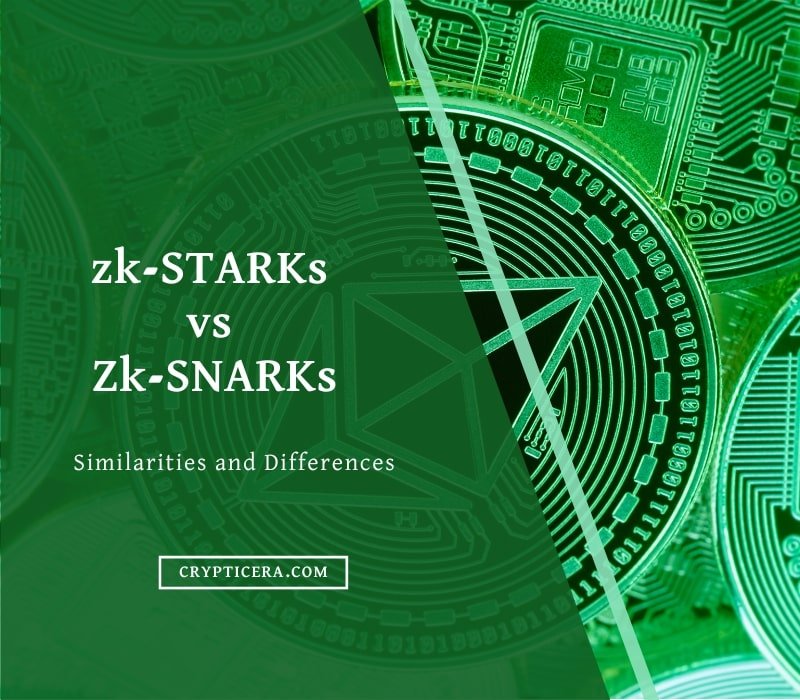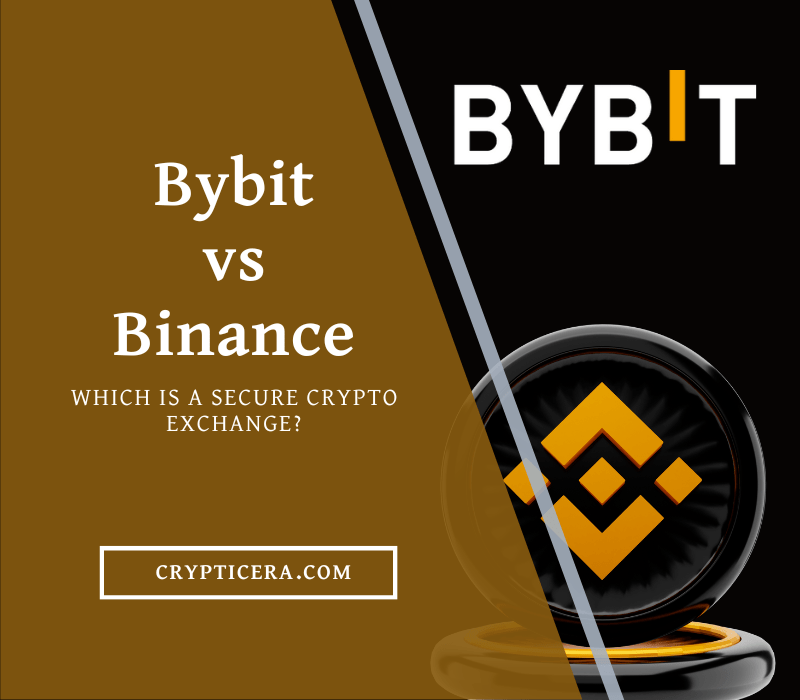Bitcoin and Ethereum are two of the most popular cryptocurrencies on the market today. Many people are familiar with Bitcoin, but Ethereum is quickly gaining popularity due to its unique features and potential for growth.
In this post, we’ll compare the two cryptocurrencies and discuss some of the key differences between them.
Key Takeaways:
- Bitcoin was created as a digital currency for peer-to-peer transactions, while Ethereum’s blockchain was designed to support smart contract functionality.
- Bitcoin uses the SHA-256 hashing algorithm for mining, whereas Ethereum is now PoS.
- Ethereum’s blockchain has a faster block time than Bitcoin, allowing for quicker transactions and confirmations.
- Ethereum is currently transitioning to PoS, While Bitcoin is moving towards a lightning network.
Bitcoin vs Ethereum: At a Glance
| Feature | Bitcoin | Ethereum |
|---|---|---|
| Purpose | Digital currency | Platform for dapps |
| Transaction processing capabilities | Limited | 15-25 tps |
| Verification mechanism | Proof of work | Proof of stake |
| Token Supply | Limited (21 million) | No maximum |
| Algorithm | SHA-256 | Ethash |
| Block time | 10 minutes | 15 seconds |
| Can be stored in a digital wallet | Yes | Yes |
| Can be bought and sold on exchanges | Yes | Yes |
| Popularity and mainstream adoption | High | High |
| Price volatility and risk as an investment | High | High |
| Type of network | Permissionless | Permissionless |
| Decentralized finance (DeFi) capabilities | Limited | High |
| Support for smart contracts | Limited | Extensive |
What is Bitcoin (BTC)?
An unknown person or group of people using the pseudonym Satoshi Nakamoto created Bitcoin in 2009.
It is a decentralized digital currency that operates on a peer-to-peer network. Unlike traditional currencies, which central banks issue, Bitcoin does not need a central authority to create and manage it.
Transactions with Bitcoin appear on a public ledger called the blockchain, and users can make transactions anonymously.
The supply and demand on exchanges determine the value of Bitcoin, which has become a popular way to store and transfer value.
Bitcoin website: https://bitcoin.org/en/
Key Features of Bitcoin
- Bitcoin is decentralized and operates on a peer-to-peer network
- Transactions are recorded on a public ledger called the blockchain
- Bitcoin allows for anonymous transactions
- There is a limited supply of 21 million bitcoins
- Bitcoin allows for fast and inexpensive global transactions
- It is not subject to traditional financial institution fees and regulations
- The blockchain technology used by Bitcoin is secure and transparent
- There is no central point of failure in the Bitcoin network
- Bitcoin can be stored in a digital wallet
- Transactions are irreversible once added to the blockchain
- Bitcoin can be bought and sold on exchanges using other currencies
Pros and Cons of Bitcoin
| Advantages of Bitcoin | Disadvantages of Bitcoin |
|---|---|
| Decentralization | Volatility |
| Security | Lack of regulation |
| Lower fees | Limited acceptance |
| Accessibility | Scams and hacking |
| Potential for anonymity | The difficulty of use for non-technical users |
| Immutability of transactions | Limited options for customer support |
| Fast transaction speeds | Potential for loss or theft of private keys |
| Global availability | Potential for government restrictions or bans |
What is Ethereum (ETH)?
Ethereum is a decentralized open-source blockchain platform that runs smart contracts.
These smart contracts are applications that run exactly as programmed without any possibility of downtime, censorship, fraud, or third-party interference.
Ethereum is the second-largest cryptocurrency by market capitalization, after Bitcoin. It was first proposed in 2013 by Vitalik Buterin, a cryptocurrency researcher and programmer.
Website URL: https://ethereum.org/en/
Key Features of Ethereum
- Ethereum is a decentralized platform that runs smart contracts: applications that run exactly as programmed without any possibility of downtime, censorship, fraud, or third-party interference.
- Ethereum has undergone several upgrades, the most recent of which is called Ethereum 2.0, which aims to improve the scalability and sustainability of the platform.
- It has a strong community of developers and users, and many new projects and innovations are built on top of the Ethereum platform.
- Ethereum is the second-largest cryptocurrency by market capitalization, after Bitcoin.
- It is an open-source project, and its development is driven by a community of volunteers.
- Ethereum allows developers to create and deploy their own decentralized applications, or “dapps,” on the Ethereum platform.
- It has its own programming language, called Solidity, that allows developers to write smart contracts on the Ethereum platform.
- The Ethereum blockchain is powered by the native cryptocurrency of the platform, called Ether (ETH).
- Ethereum has a system of “gas” to incentivize the network and pay for computational resources.
- Its blockchain is also used for initial coin offerings (ICOs), which are a form of crowdfunding for new cryptocurrency projects.
Pros and Cons of Ethereum
| Pros | Cons |
|---|---|
| Decentralized platform | Not yet widely adopted |
| Ability to create and deploy decentralized applications (DApps) | Complexity can make it difficult to understand and use |
| Use of smart contracts to facilitate transactions | Not backed by any central authority |
| Potential for lower transaction fees than traditional payment systems | Scalability limitations |
| open-source | |
| Security and transparency |
Also Read: Ethereum vs Solana
Comparison between Ethereum and Bitcoin
Mode of Payments
Many merchants and businesses accept bitcoin as a form of payment, and both online and brick-and-mortar retailers accept it directly.
In contrast, Ethereum is primarily used as a platform for building decentralized applications and is not as widely accepted as a form of payment.
Bitcoin’s limited transaction processing capacity can cause bottlenecks and high fees during peak demand, making it less attractive as a payment option. Users may have to wait for their transactions to be confirmed or pay higher fees to have them processed quickly.
In contrast, Ethereum is designed to be more scalable and can process a higher number of transactions per second, potentially making it a more attractive option for users who want fast and inexpensive payments.
Additionally, the fees for sending bitcoin can vary depending on network conditions, while the gas fees for sending ether, the native currency of the Ethereum network, are generally higher and more unstable.
DApps
One of the main differences between the two is the purpose and intended use. As mentioned earlier, bitcoin was originally created as a digital currency for peer-to-peer transactions, while Ethereum was designed to be a platform for building and running apps.
This means that Ethereum has extensive support for dapps and smart contracts, while bitcoin’s support is more limited.
Another difference is the programming languages that are used on each network. Bitcoin uses a simple scripting language that is not well-suited to the development of complex dapps and smart contracts.
In contrast, Ethereum uses a more powerful and versatile programming language called Solidity, which was specifically designed for dapps and smart contracts. This makes it easier for developers to build and deploy dapps on the Ethereum network.
Energy Consumption
Bitcoin mining is known to be highly energy-intensive. The process of mining bitcoin (PoW) involves solving complex mathematical problems. It requires specialized hardware and a significant amount of electricity.
As a result, the energy consumption of the bitcoin network is estimated to be in the range of 55 to 65 terawatt-hours per year, which is equivalent to the annual energy consumption of countries like Nigeria or the Czech Republic.
In contrast, Ethereum staking is less energy-intensive than bitcoin mining. This is Because the process of staking does not involve solving complex mathematical problems, it does not require as much computing power or electricity.
As a result, the energy consumption of the Ethereum network is estimated to be much lower, at around 5.2 terawatt-hours per year and even less.
Consensus Mechanism
Bitcoin and Ethereum use different consensus mechanisms. Bitcoin uses a proof-of-work (PoW) system, while Ethereum uses a proof-of-stake (PoS) system.
In a proof-of-work system, miners compete to solve complex mathematical problems in order to validate transactions and add them to the blockchain.
In a proof-of-stake system, on the other hand, the likelihood of a miner adding a block to the blockchain is determined by the number of coins they hold, or “stake.”
Algorithm
The US National Security Agency developed the SHA-256 algorithm, which is a member of the SHA-2 family of cryptographic hash functions and powers the bitcoin network.
This algorithm is secure and widely used, and it effectively resists attacks, meeting the needs of the bitcoin network.
On the other hand, the Ethash algorithm was developed specifically for the Ethereum network and belongs to the Dagger-Hashimoto family of algorithms.
It is memory-hard, requiring a large amount of memory to execute, which protects the Ethereum network from attacks and preserves its decentralization.
Scalability
Bitcoin uses a proof-of-work (PoW) consensus mechanism. This mechanism limits the number of transactions it can process per second, leading to scalability issues.
Ethereum, however, uses a proof-of-stake (PoS) consensus mechanism, allowing it to process more transactions per second. This makes it more scalable than Bitcoin in the short term.
Furthermore, Ethereum is implementing a technology called “sharding” to further improve its scalability.
Token Economics
One of the main differences between the two is the supply of tokens. In the case of BTC, there will only ever be 21 million bitcoins in existence.
The limited supply is intended to prevent inflation and ensure that the value of a bitcoin remains stable over time.
In contrast, there is no maximum supply of ETH, the native currency of the Ethereum network.
The supply of ether can potentially increase over time, which could potentially lead to inflation.
Proof-of-Work vs Proof-of-Stake
| Property | Proof of Work | Proof of Stake |
|---|---|---|
| Mechanism | Solving puzzles | Staking tokens |
| Computational intensity | High | Low |
| Energy intensity | High | Low |
| Security | High | Low |
| Decentralization | High | Low |
| Block creation rate | Dynamic | Fixed |
| The reward for creating a new block | Block reward plus transaction fees | Block reward plus a portion of transaction fees |
| Participation | Open to all | Restricted to users with a stake in the network |
| Risk of centralization | Low | High |
BTC vs ETH: Winner
| Property | Bitcoin (Proof of Work) | Ethereum (Proof of Stake) |
|---|---|---|
| The mechanism for achieving consensus | Proof of work | Proof of stake |
| Process of creating new blocks | Mining | Staking |
| Computational intensity | High | Low |
| Energy intensity | High | Low |
| Security | High | Low |
| Decentralization | High | Low |
| Block creation rate | Dynamic | Fixed |
| The reward for creating a new block | Block reward plus transaction fees | Block reward plus a portion of transaction fees |
| Participation | Open to all | Restricted to users with a stake in the network |
| Risk of centralization | Low | High |
Conclusion
In conclusion, while Bitcoin and Ethereum share some similarities, they also have some key differences. Bitcoin is a digital currency, while Ethereum is a platform for running smart contracts and decentralized applications.
Ethereum’s proof-of-stake consensus algorithm and potential for unlimited supply make it unique among cryptocurrencies.
Ultimately, both Bitcoin and Ethereum have a lot to offer, and it will be interesting to see how they continue to evolve in the future.
FAQs
Which one is more valuable, Bitcoin or Ethereum?
It is difficult to say which one is more valuable, as the value of cryptocurrencies can be highly volatile and is often influenced by a wide range of factors, such as market demand, news events, and regulatory developments.
At the time of writing, Bitcoin is currently the more valuable of the two, with a market capitalization of over $800 billion, compared to Ethereum’s market cap of around $200 billion.
Can you store both Bitcoin and Ethereum in the same wallet?
Yes, it is possible to store both Bitcoin and Ethereum in the same wallet, as long as the wallet in question supports both cryptocurrencies.
There are many different types of cryptocurrency wallets available, including hardware wallets (Ledger vs Trezor), software wallets (Trust wallet), and paper wallets, which can be used to securely store Bitcoin and Ethereum.
Are Bitcoin and Ethereum subject to the same regulations?
The regulatory landscape for cryptocurrencies like Bitcoin and Ethereum can vary depending on the country or jurisdiction in which they are being used.
In general, both Bitcoin and Ethereum are subject to some level of regulation, and the specific rules and regulations that apply may vary depending on factors such as the intended use of the cryptocurrency and the location of the user.
Can you use both Bitcoin and Ethereum for online purchases?
Yes, both Bitcoin and Ethereum can be used for online purchases, as well as for other purposes such as remittances and international money transfers. However, the acceptance of cryptocurrencies for online purchases can vary depending on the merchant, and not all merchants may accept Bitcoin or Ethereum as a form of payment.
Bitcoin has more widespread use as a mode of payment thanks to its low transaction fees and bitcoin lightning Network.
Additionally, the value of cryptocurrencies can be volatile, so it is important to carefully consider the risks and potential benefits of using them for online purchases.


